By Leen Randell
Updated: Jul 10, 2024
10 Best Herbal Decoctions For Stomach Discomfort
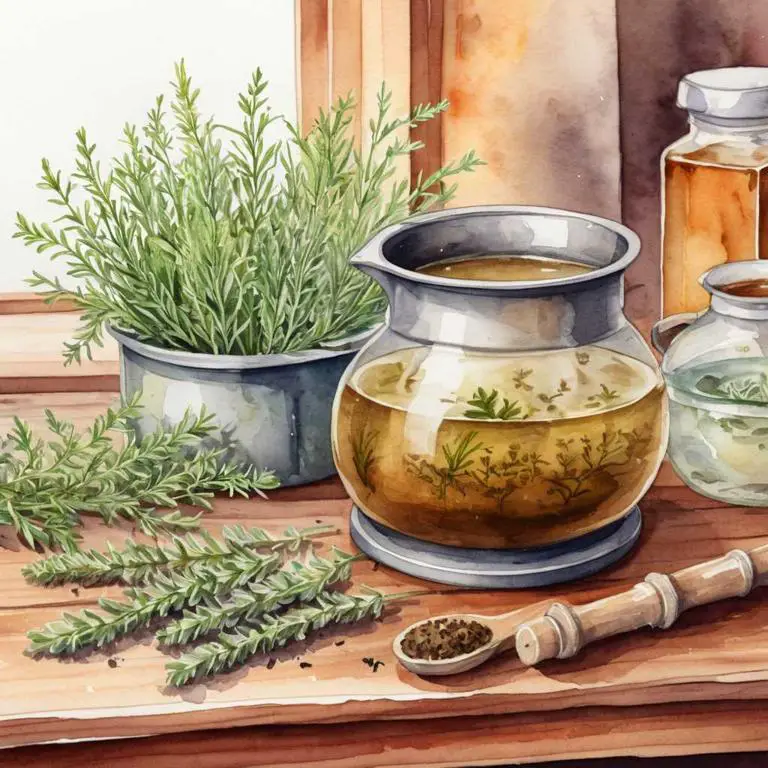
Herbal decoctions for stomach discomfort are a natural and effective way to soothe digestive issues, alleviating symptoms such as bloating, cramps, and nausea.
By steeping herbs in hot water, the bioactive compounds are released, providing relief from stomach discomfort. Examples of beneficial herbal decoctions include peppermint tea, which calms the digestive tract, and ginger tea, which reduces inflammation.
For those who suffer from chronic stomach issues, these decoctions can significantly improve their quality of life, allowing them to enjoy daily activities without discomfort or pain.
The following article describes in detail the most important decoctions for stomach discomfort, including medicinal properties, parts of herbs to use, and recipes for preparations.
- 1. Glycyrrhiza glabra
- 2. Matricaria chamomilla
- 3. Zingiber officinale
- 4. Foeniculum vulgare
- 5. Tilia platyphyllos
- 6. Cnidium monnieri
- 7. Carum carvi
- 8. Sambucus nigra
- 9. Taraxacum officinale
- 10. Pimpinella anisum
- What is the best combination of herbal decoctions to use for stomach discomfort?
- What ailments similar to stomach discomfort are treated with herbal decoctions?
1. Glycyrrhiza glabra
Licorice decoctions helps with stomach discomfort because of its soothing properties that calm inflammation in the digestive tract.
The glycyrrhizin present in licorice root has a natural anti-inflammatory effect, reducing irritation and discomfort caused by acid reflux, heartburn, and irritable bowel syndrome (IBS). Additionally, licorice's demulcent nature forms a protective barrier on the mucous membranes, shielding them from harsh stomach acids and irritants.
This results in relief from bloating, cramps, and nausea, promoting digestive harmony and overall well-being.

Medicinal Constituents
The list below shows the primary medicinal constituents in Glycyrrhiza glabra decoctions that help with stomach discomfort.
- Licorice saponins: These triterpenoid saponins help with stomach discomfort by reducing inflammation in the stomach lining and protecting it from acid damage.
- Glycyrrhizin: This triterpenoid glycoside helps with stomach discomfort by inhibiting the production of stomach acid and reducing inflammation in the stomach, which helps to alleviate heartburn and acid reflux.
- Flavonoids: These phenolic compounds help with stomach discomfort by exhibiting antioxidant and anti-inflammatory properties, which help to reduce oxidative stress and inflammation in the stomach, thereby alleviating symptoms of stomach discomfort.
Parts Used
The list below shows the primary parts of licorice used to make decoctions for stomach discomfort.
- Roots: Roots are the primary part used due to their high glycyrrhizin content, which is responsible for anti-inflammatory and carminative properties that soothe stomach discomfort.
- Leaves: Leaves are used to make decoctions that help reduce inflammation and alleviate symptoms of digestive issues, such as bloating and gas.
- Barks: Barks are used to prepare decoctions that have a mild laxative effect and help to stimulate digestion, reducing symptoms of constipation and indigestion.
Quick Recipe
The following recipe gives a procedure to make a basic licorice for stomach discomfort.
- Gather 5-10 grams of dried glycyrrhiza glabra roots and rinse them with cold water to remove impurities.
- Steep the roots in 500 milliliters of boiling water for 5-10 minutes to release their active compounds.
- Strain the liquid through a cheesecloth or a fine-mesh sieve into a clean container to remove solids.
- Discard the solids and store the decoction in a cool dark place for up to 24 hours before consumption.
- Take 20-30 milliliters of the decoction 2-3 times a day as needed to achieve desired effects.
2. Matricaria chamomilla
Chamomile decoctions helps with stomach discomfort because it contains apigenin, an antioxidant that calms the digestive tract and reduces inflammation.
The soothing properties of chamomile also ease digestive spasms, allowing the gut to function more smoothly and reducing symptoms such as bloating, cramps, and diarrhea. Additionally, chamomile's anti-inflammatory compounds help to heal any irritation or ulcers in the stomach lining, promoting a healthy and balanced digestive system.
As a result, drinking chamomile decoctions can provide fast and effective relief from stomach discomfort.
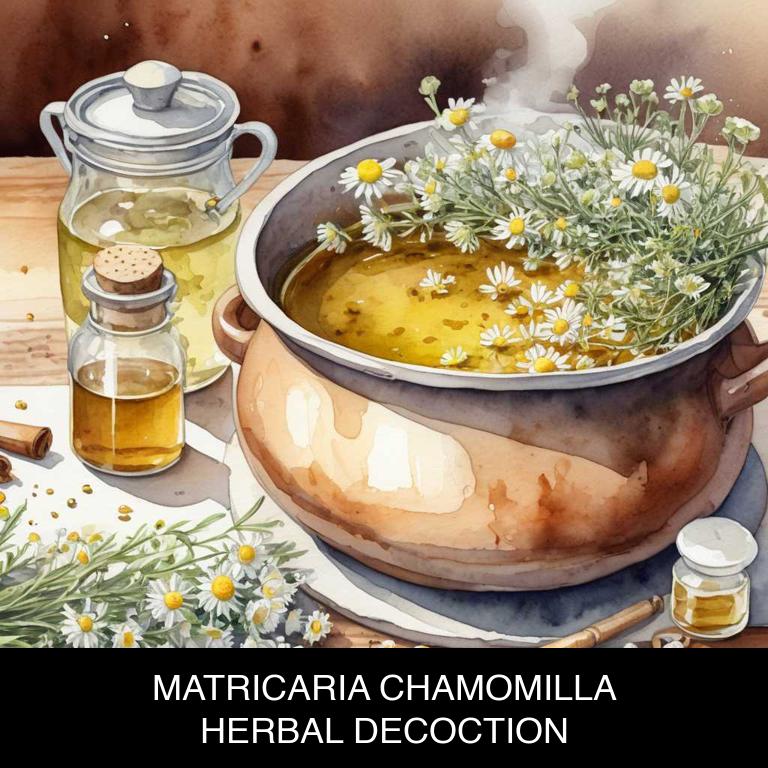
Medicinal Constituents
The list below shows the primary medicinal constituents in Matricaria chamomilla decoctions that help with stomach discomfort.
- Apigenin: Apigenin, a flavonoid, helps with stomach discomfort by reducing inflammation and soothing the stomach lining, thereby alleviating symptoms of nausea and indigestion.
- Bisabolol: Bisabolol, a sesquiterpene alcohol, helps with stomach discomfort by reducing inflammation and promoting the healing of stomach ulcers, which can cause stomach pain and discomfort.
- Matricaria chamomilla flavonoids: The flavonoids present in Matricaria chamomilla, including apigenin and luteolin, help with stomach discomfort by inhibiting the production of stomach acid and reducing inflammation in the digestive tract.
Parts Used
The list below shows the primary parts of chamomile used to make decoctions for stomach discomfort.
- Flowers: They are rich in apigenin, a flavonoid that has anti-inflammatory and soothing properties, making them effective in relieving stomach discomfort.
- Leaves: They contain essential oils and flavonoids that have anti-inflammatory and antispasmodic properties, helping to calm stomach cramps and discomfort.
- Seeds: They contain triterpene saponins that have anti-inflammatory and soothing effects, which help to alleviate stomach discomfort and reduce inflammation.
Quick Recipe
The following recipe gives a procedure to make a basic chamomile for stomach discomfort.
- Harvest 20-30 fresh flowers in the morning when they are in full bloom.
- Dry the flowers in a warm dark place for 7-10 days to preserve their potency.
- Chop 2-3 teaspoons of dried flowers into fine pieces to increase their surface area.
- Combine the chopped flowers with 1 cup of boiling water in a heat-resistant container.
- Steep the mixture for 5-7 minutes then strain and discard the solids.
3. Zingiber officinale
Ginger decoctions helps with stomach discomfort because its natural anti-inflammatory properties help to reduce inflammation in the digestive tract, alleviating symptoms such as bloating, cramps, and nausea.
The decoction's warmth also stimulates digestion, allowing food to move through the digestive system more efficiently, which can ease symptoms of indigestion and bloating. Additionally, ginger has been shown to increase saliva production, which can help neutralize stomach acid and reduce discomfort.
By soothing and stimulating the digestive system, herbal ginger decoctions provide natural relief from stomach discomfort.
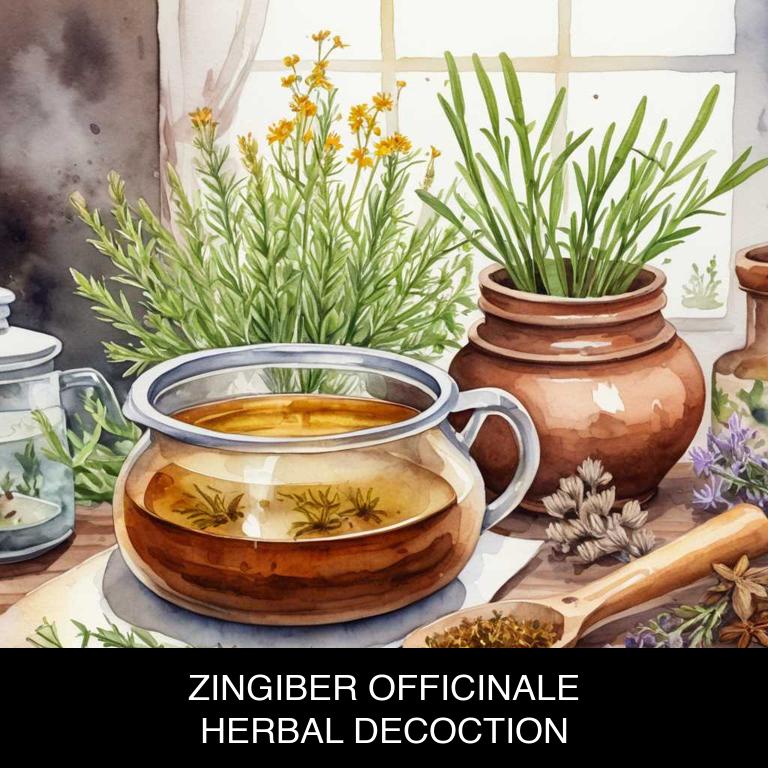
Medicinal Constituents
The list below shows the primary medicinal constituents in Zingiber officinale decoctions that help with stomach discomfort.
- Gingerols: Gingerols are a type of phenolic compound that help alleviate stomach discomfort by reducing inflammation and inhibiting the production of pro-inflammatory enzymes.
- Shogaols: Shogaols are a type of phenolic compound that help ease stomach discomfort by inhibiting the activity of digestive enzymes and reducing inflammation in the digestive tract.
- 6-gingerol: 6-Gingerol is a type of gingerol that helps alleviate stomach discomfort by reducing nausea and vomiting, and also has anti-inflammatory properties that help soothe the digestive tract.
Parts Used
The list below shows the primary parts of ginger used to make decoctions for stomach discomfort.
- Buds: Ginger buds contain a high concentration of volatile oils, which are released when the buds are bruised or crushed, providing relief from nausea and stomach upset.
- Roots: The roots of ginger contain a mixture of compounds that help soothe and calm the digestive system, reducing inflammation and discomfort in the stomach.
Quick Recipe
The following recipe gives a procedure to make a basic ginger for stomach discomfort.
- Measure out 1 teaspoon of dried zingiber officinale root for every 8 ounces of water.
- Combine the measured zingiber officinale root with 8 ounces of water in a saucepan.
- Heat the mixture over medium heat for 5-10 minutes or until it starts to boil.
- Reduce the heat to low and simmer for 10-15 minutes or until the mixture thickens slightly.
- Strain the decoction through a cheesecloth or a fine-mesh sieve into a cup.
4. Foeniculum vulgare
Fennel decoctions helps with stomach discomfort because of its unique properties that soothe and calm the digestive system.
The plant's essential oils, particularly anethole, have a natural anti-inflammatory effect that reduces irritation and inflammation in the gut. This, combined with fennel's ability to relax muscles and increase digestive enzyme production, helps to ease symptoms such as bloating, cramps, and gas.
Additionally, fennel's mild carminative properties help to expel trapped gases, providing quick relief from stomach discomfort.
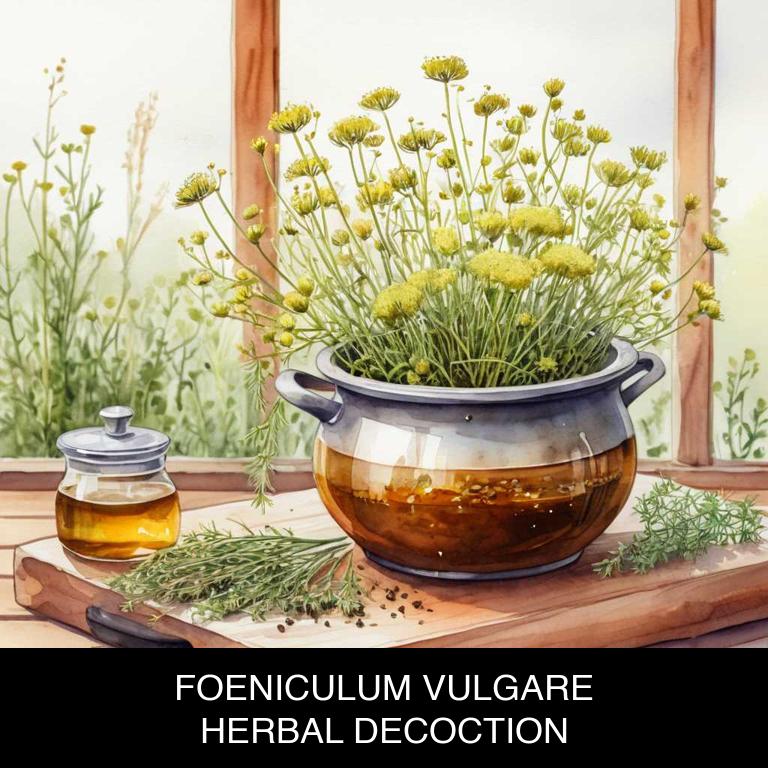
Medicinal Constituents
The list below shows the primary medicinal constituents in Foeniculum vulgare decoctions that help with stomach discomfort.
- Foeniculin: This sesquiterpene alcohol has anti-inflammatory and spasmolytic properties, which help alleviate stomach cramps and discomfort by relaxing the smooth muscle in the digestive tract.
- Anethole: This phenylpropene is responsible for the carminative and antispasmodic effects of Foeniculum vulgare, helping to reduce gas, bloating, and stomach discomfort by relaxing the muscles and improving digestion.
- Trans-anethol: This isomer of anethole has been shown to possess anti-inflammatory and antioxidant properties, which may help protect the stomach lining from damage and reduce inflammation that can contribute to discomfort.
Parts Used
The list below shows the primary parts of fennel used to make decoctions for stomach discomfort.
- Seeds: They are commonly used due to their high carminative and antispasmodic properties, which help to ease digestive discomfort and alleviate cramps.
- Leaves: The leaves are used because of their ability to reduce inflammation and ease digestive issues, making them a popular choice for soothing stomach discomfort.
- Stems: The stems are used as they contain a compound called anethole, which has a calming effect on the digestive system and helps to alleviate stomach upset.
Quick Recipe
The following recipe gives a procedure to make a basic fennel for stomach discomfort.
- Gather 2 teaspoons of dried foeniculum vulgare leaves and flowers and store them in a clean container.
- Boil 1 cup of water in a saucepan for 5 minutes to create a suitable decoction base.
- Add the dried foeniculum vulgare mixture to the boiling water and stir gently to prevent loss.
- Simmer the decoction mixture for 10 minutes to allow the active compounds to infuse properly.
- Strain the decoction mixture through a fine-mesh sieve into a clean cup or container immediately.
5. Tilia platyphyllos
Broad-leaved lime decoctions helps with stomach discomfort because of its natural ability to soothe digestive issues.
The herbal extract contains compounds that have anti-inflammatory properties, which help to reduce inflammation and alleviate symptoms such as bloating, cramps, and nausea. Additionally, the decoction's bitter taste can stimulate digestion and improve gut motility, allowing for smoother digestion and elimination of waste products.
As a result, herbal broad-leaved lime decoctions can provide quick relief from stomach discomfort and promote overall digestive health.
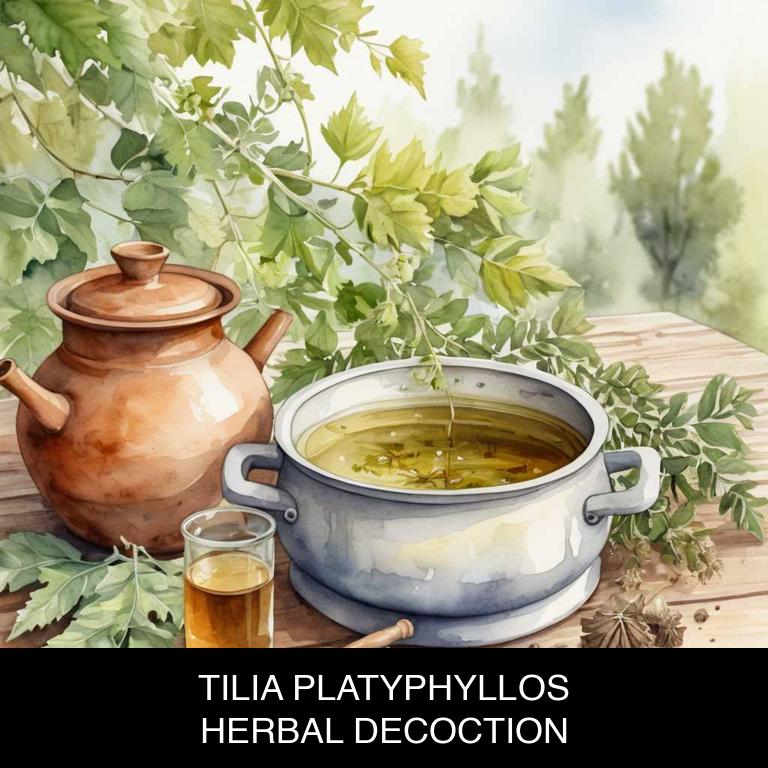
Medicinal Constituents
The list below shows the primary medicinal constituents in Tilia platyphyllos decoctions that help with stomach discomfort.
- Flavonoids: Flavonoids in Tilia platyphyllos decoctions have anti-inflammatory properties, which help to reduce inflammation in the stomach and alleviate discomfort associated with conditions like gastritis and peptic ulcers.
- Terpenoids: Terpenoids present in Tilia platyphyllos have soothing effects on the stomach, helping to reduce spasms and calm digestive issues, such as irritable bowel syndrome (IBS).
- Phenolic acids: Phenolic acids in Tilia platyphyllos decoctions possess antioxidant properties, which help protect the stomach lining from oxidative stress and inflammation, thus reducing the risk of stomach ulcers and discomfort.
Parts Used
The list below shows the primary parts of broad-leaved lime used to make decoctions for stomach discomfort.
- Leaves: Used for their anti-inflammatory and soothing properties, which can help ease stomach discomfort and reduce inflammation.
- Buds: Utilized for their mild sedative effects, which can aid in calming digestive issues and promoting relaxation.
- Barks: Employed for their astringent and anti-inflammatory properties, which can help soothe stomach discomfort and reduce inflammation.
Quick Recipe
The following recipe gives a procedure to make a basic broad-leaved lime for stomach discomfort.
- Harvest fresh leaves of tilia platyphyllos in the morning after the dew has dried for optimal flavor and aroma.
- Clean the harvested leaves by rinsing them gently with cold water to remove any dirt or debris.
- Combine 1 tablespoon of fresh tilia platyphyllos leaves with 1 cup of boiling water to create a decoction.
- Simmer the decoction for 5-10 minutes over low heat to allow the active compounds to infuse.
- Strain the decoction through a fine-mesh sieve into a cup and discard the solids for consumption.
6. Cnidium monnieri
Monk's pepper decoctions helps with stomach discomfort because of its unique properties that soothe and calm the digestive system.
The active compounds in monk's pepper, such as flavonoids and phenolic acids, have natural anti-inflammatory and antioxidant effects that reduce inflammation and irritation in the stomach lining, providing relief from symptoms like bloating, cramps, and gas.
Additionally, the decoction helps to regulate digestion, improve gut motility, and strengthen the stomach muscles, promoting a healthy digestive environment.
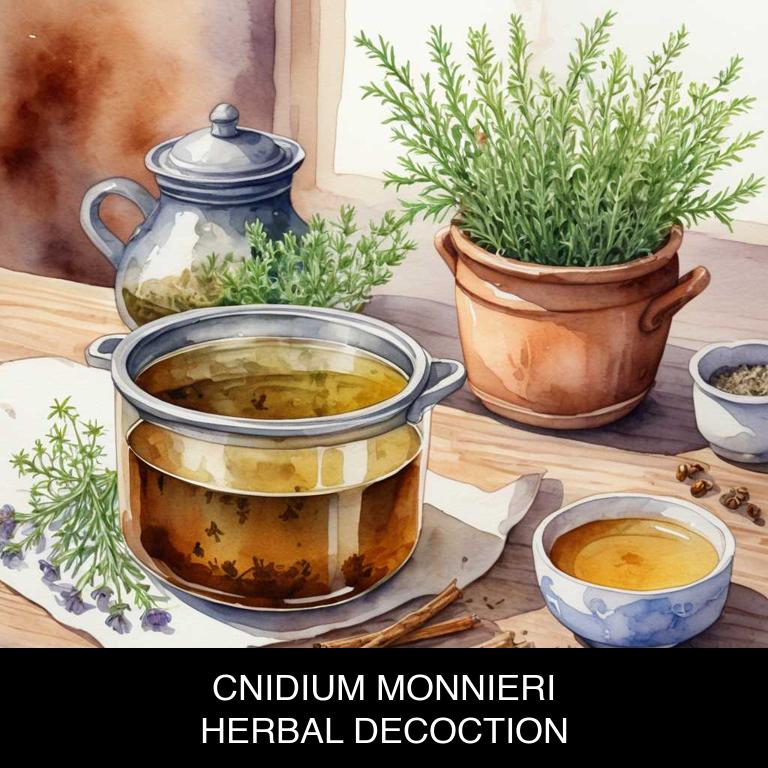
Medicinal Constituents
The list below shows the primary medicinal constituents in Cnidium monnieri decoctions that help with stomach discomfort.
- Phenolic acids: They help to reduce inflammation and alleviate stomach discomfort by inhibiting the production of pro-inflammatory enzymes and cytokines.
- Coumarins: They have been shown to have anti-inflammatory and antioxidant properties, which can help to soothe stomach irritation and reduce symptoms of stomach discomfort.
- Lignans: They have been found to have gastroprotective effects, which can help to prevent stomach ulcers and alleviate symptoms of stomach discomfort by reducing inflammation and improving gut health.
Parts Used
The list below shows the primary parts of monk's pepper used to make decoctions for stomach discomfort.
- Roots: Roots: The primary part used due to its high concentration of compounds responsible for medicinal properties.
- Leaves: Leaves: The leaves are also used as they contain a significant amount of flavonoids and other bioactive compounds that help alleviate stomach issues.
- Seeds: Seeds: The seeds are another commonly used part, containing lignans and other compounds that aid in treating stomach discomfort and digestive problems.
Quick Recipe
The following recipe gives a procedure to make a basic monk's pepper for stomach discomfort.
- Harvest cnidium monnieri roots and clean them thoroughly to remove any dirt or debris.
- Slice the roots into small pieces weighing approximately 10-20 grams for a standard decoction.
- Combine the sliced roots with 500 milliliters of water in a medium-sized saucepan.
- Boil the mixture for 15-20 minutes or until the liquid has reduced to approximately 250 milliliters.
- Strain the decoction through a cheesecloth or fine-mesh sieve into a separate container.
7. Carum carvi
Caraway decoctions helps with stomach discomfort because of its unique composition, which includes volatile oils and flavonoids that work synergistically to soothe and calm the digestive system.
The carvone content in particular has been shown to reduce inflammation and ease cramping, making it an effective natural remedy for alleviating symptoms of indigestion, bloating, and abdominal pain.
Additionally, caraway decoctions have antimicrobial properties that help eliminate harmful bacteria and promote a healthy gut environment, further reducing discomfort and promoting overall digestive well-being.
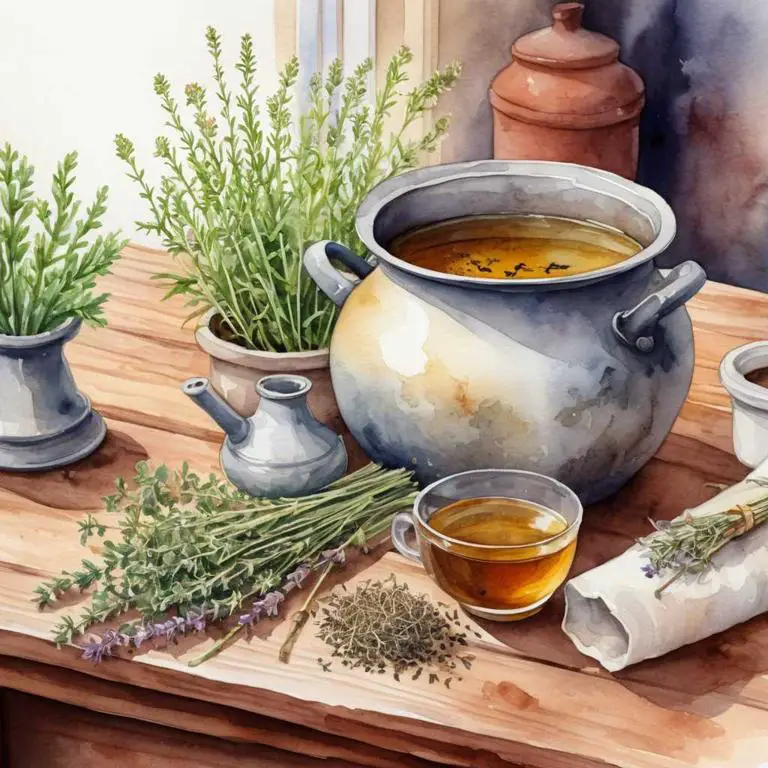
Medicinal Constituents
The list below shows the primary medicinal constituents in Carum carvi decoctions that help with stomach discomfort.
- Carvone: Carvone is a monoterpene ketone that helps alleviate stomach discomfort by exhibiting carminative and antispasmodic properties, which help reduce gas and alleviate cramps.
- Daucosterol: Daucosterol is a phytosterol that helps soothe stomach discomfort by reducing inflammation and exerting a calming effect on the gastrointestinal tract.
- Bornyl acetate: Bornyl acetate is a terpene that contributes to the antispasmodic and carminative effects of Carum carvi, helping to relax the muscles in the stomach and reduce gas.
Parts Used
The list below shows the primary parts of caraway used to make decoctions for stomach discomfort.
- Seeds: The seeds are the most commonly used part due to their carminative and antispasmodic properties, which help to alleviate stomach discomfort.
- Roots: The roots of Carum carvi are used to make decoctions that help to soothe the stomach and reduce inflammation, providing relief from discomfort.
- Leaves: The leaves are used in decoctions to help ease stomach cramps and spasms, promoting relaxation and reducing discomfort.
Quick Recipe
The following recipe gives a procedure to make a basic caraway for stomach discomfort.
- Harvest 10 to 20 grams of carum carvi roots or seeds in the morning after dew has evaporated.
- Rinse the harvested carum carvi roots or seeds thoroughly with cold water to remove any dirt.
- Simmer the carum carvi roots or seeds in 250 milliliters of water over low heat for 5 to 7 minutes.
- Strain the decoction through a fine-mesh sieve into a clean container discarding the solids.
- Allow the decoction to cool and store it in a sealed container in the refrigerator for up to 24 hours.
8. Sambucus nigra
Elder decoctions helps with stomach discomfort because they contain anthraquinones, flavonoids, and other bioactive compounds that have anti-inflammatory, antimicrobial, and antioxidant properties.
These compounds help to soothe and calm the digestive system, reducing inflammation and irritation in the stomach and intestines. The decoctions also aid in digestion by stimulating the production of digestive enzymes and improving gut motility, which can help to alleviate symptoms such as bloating, gas, and abdominal pain.
As a result, elder decoctions can provide relief from stomach discomfort and promote overall digestive health.
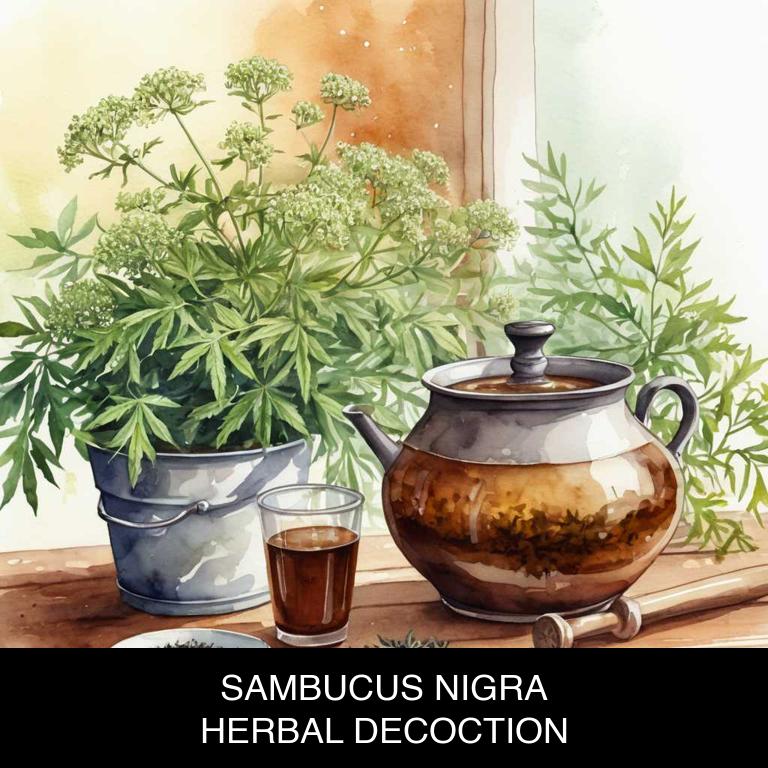
Medicinal Constituents
The list below shows the primary medicinal constituents in Sambucus nigra decoctions that help with stomach discomfort.
- Flavonoids: Flavonoids in Sambucus nigra decoctions help with stomach discomfort by exhibiting antioxidant properties, which reduce inflammation and alleviate gastrointestinal issues.
- Phenolic acids: Phenolic acids in Sambucus nigra decoctions aid in stomach discomfort by possessing antimicrobial and anti-inflammatory properties, which can help soothe digestive issues and reduce symptoms of stomach discomfort.
- Isoflavones: Isoflavones present in Sambucus nigra decoctions help alleviate stomach discomfort by exhibiting anti-inflammatory and antioxidant properties, which can help reduce inflammation and alleviate symptoms of stomach discomfort.
Parts Used
The list below shows the primary parts of elder used to make decoctions for stomach discomfort.
- Flowers: They are used due to their high anthocyanin and flavonoid content, which have anti-inflammatory properties that help soothe stomach discomfort.
- Fruits: They are used because they contain malic acid, which helps to alleviate digestive issues and reduce stomach discomfort.
- Leaves: They are used due to their bitter properties, which can help stimulate digestion and relieve stomach cramps and discomfort.
Quick Recipe
The following recipe gives a procedure to make a basic elder for stomach discomfort.
- Harvest fresh sambucus nigra berries in late summer when they are ripe and full of color.
- Dry the harvested berries in a cool dark place for several days to remove excess moisture.
- Measure out 2-3 teaspoons of dried sambucus nigra berries and add to 1 liter of boiling water.
- Reduce heat and let the decoction simmer for 5-10 minutes to release the active compounds.
- Strain the decoction through a cheesecloth or fine-mesh sieve into a clean container.
9. Taraxacum officinale
Dandelion decoctions helps with stomach discomfort because of its natural digestive properties.
The plant contains inulin, a prebiotic fiber that feeds good bacteria in the gut, promoting a healthy gut microbiome. This can help soothe digestive issues such as bloating, cramps, and indigestion by reducing inflammation and improving digestion. Additionally, dandelion's bitter compounds stimulate digestive enzymes, which can aid in breaking down food and alleviating stomach discomfort.
Drinking dandelion decoctions may provide relief from these symptoms, promoting a smoother and more comfortable digestive process.

Medicinal Constituents
The list below shows the primary medicinal constituents in Taraxacum officinale decoctions that help with stomach discomfort.
- Taraxasterol: It helps with stomach discomfort by exhibiting anti-inflammatory and antioxidant properties, which can reduce inflammation and protect the stomach lining from damage.
- Inulin: It helps with stomach discomfort by acting as a prebiotic, promoting the growth of beneficial gut bacteria, and regulating bowel movements, thereby alleviating symptoms of constipation and diarrhea.
- Apigenin: It helps with stomach discomfort by exhibiting anti-inflammatory and antispasmodic properties, which can reduce inflammation and relax the muscles in the stomach, thereby relieving symptoms of cramps and spasms.
Parts Used
The list below shows the primary parts of dandelion used to make decoctions for stomach discomfort.
- Roots: They are the primary source of inulin, a prebiotic that helps alleviate stomach discomfort by promoting gut health.
- Leaves: They contain flavonoids and terpenes, which have anti-inflammatory properties that can soothe stomach discomfort.
- Flowers: They possess mucilages that can help calm stomach irritation and reduce inflammation.
Quick Recipe
The following recipe gives a procedure to make a basic dandelion for stomach discomfort.
- Harvest 25-30 fresh taraxacum officinale leaves and flowers from the morning sun.
- Chop the taraxacum officinale leaves and flowers into small pieces using a sharp knife.
- Combine 2 teaspoons of chopped taraxacum officinale with 1 quart of boiling water in a pot.
- Steep the taraxacum officinale mixture for 5-7 minutes or until the liquid has reduced slightly.
- Strain the taraxacum officinale decoction through a cheesecloth or a fine-mesh sieve into a cup.
10. Pimpinella anisum
Anise decoctions helps with stomach discomfort because its active compounds, such as anethole and limonene, have natural antispasmodic properties that relax the muscles in the digestive tract.
This relief reduces cramps, spasms, and inflammation, alleviating symptoms of irritable bowel syndrome (IBS), constipation, and indigestion. Additionally, anise's carminative effects help expel gas from the stomach and intestines, further easing bloating and discomfort.
As a result, anise decoctions provide natural relief for individuals experiencing stomach upset without harsh chemicals or invasive treatments.
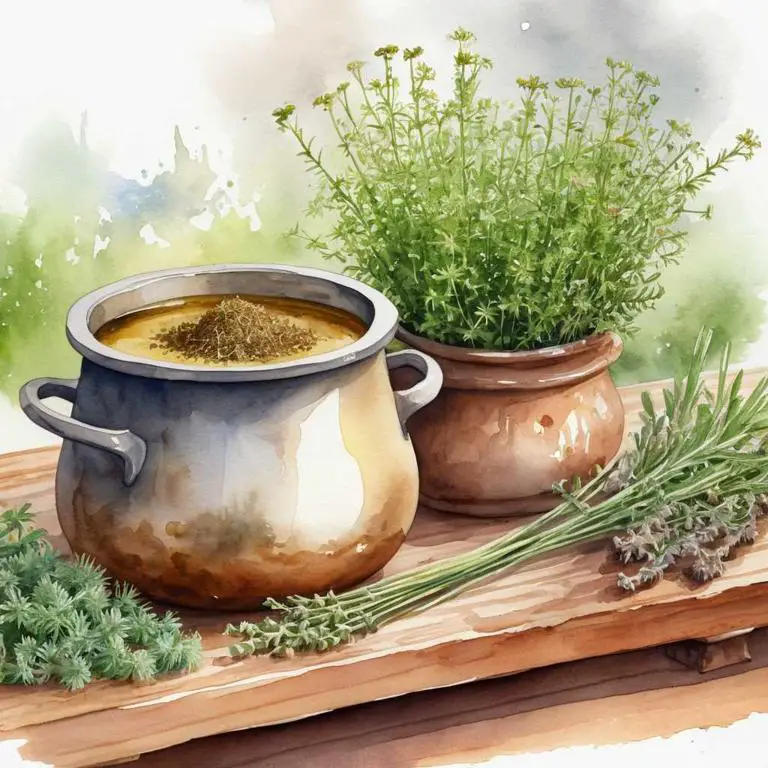
Medicinal Constituents
The list below shows the primary medicinal constituents in Pimpinella anisum decoctions that help with stomach discomfort.
- Anethole: A phenolic compound with carminative properties, helping to alleviate stomach discomfort by reducing gas and bloating.
- Ligustilide: A sesquiterpene lactone with anti-inflammatory and anti-spasmodic properties, helping to soothe stomach cramps and inflammation.
- Apiol: A phenolic compound with anti-inflammatory and antioxidant properties, helping to protect the stomach lining from damage and reduce inflammation.
Parts Used
The list below shows the primary parts of anise used to make decoctions for stomach discomfort.
- Seeds: They are used due to their carminative properties, helping to relieve bloating and gas.
- Leaves: They are used due to their anti-inflammatory properties, which may help soothe stomach discomfort and inflammation.
- Roots: They are used due to their bitter and astringent properties, which may help alleviate digestive issues and reduce stomach spasms.
Quick Recipe
The following recipe gives a procedure to make a basic anise for stomach discomfort.
- Gather 1 to 3 teaspoons of dried pimpinella anisum leaves and stems and store in an airtight container.
- Boil 1 cup of water for 5 to 10 minutes to reach a rolling boil.
- Add the pimpinella anisum mixture to the boiling water and let steep for 5 to 10 minutes.
- Strain the decoction through a fine-mesh sieve into a cup to remove the solids.
- Allow the decoction to cool for 5 to 10 minutes before consuming the herbal remedy.
What is the best combination of herbal decoctions to use for stomach discomfort?
The best combination of herbal decoctions that help with stomach discomfort is a blend of ginger, peppermint, and chamomile.
Ginger has natural anti-inflammatory properties that soothe the digestive system, while peppermint oil helps to relax the muscles in the stomach and reduce nausea. Chamomile, with its calming effects, further eases digestive upset and promotes a sense of balance.
This trio can be steeped together in hot water to create a soothing, stomach-friendly tea that provides relief from discomfort and promotes overall digestive well-being.
What ailments similar to stomach discomfort are treated with herbal decoctions?
Ailments similar to stomach discomfort that are treated with herbal decoctions are digestive issues such as constipation, diarrhea, and irritable bowel syndrome.
Herbal decoctions like peppermint, chamomile, and licorice root tea can help soothe upset stomachs and alleviate symptoms of these conditions.
Other ailments treated with herbal decoctions include menstrual cramps, fever, and respiratory issues like bronchitis and coughs.